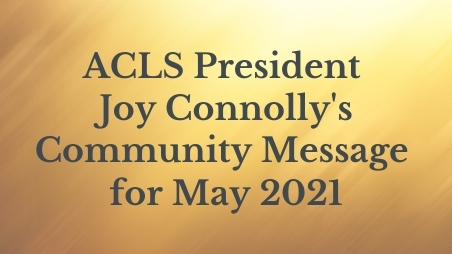ACLS Community Message for May 2021

Like faculty and students everywhere, we at ACLS are juggling winding down the 2021-21 academic year with planning for next year.
Our Annual Meeting on April 22-23, always a highlight, was a resounding success, bringing together scholars, administrators, and supporters from all over the world via Zoom. We heard about exciting directions in humanistic teaching designed to speak to today’s diverse students; we celebrated the achievements of our fellows; and, with the help of representatives of the six working groups on the future of the learned societies set up last summer, we sought to pin down our most pressing priorities for the coming year, in a world much altered by COVID-19.
The creativity and energy of the Meeting was wonderfully enhanced by two artistic performances that capped each day: Awadagin Pratt, who graced us with his rendition of “Castillo Interior” by Peteris Vasks, and the performances of three fellows from the Lab for Global Performance and Politics at Georgetown University: Jasmin Cardenas, Ada Mukhina, and Afshan D’souza-Lodhi. I want to thank all our speakers and performers as well as our attendees, our dedicated Board, and the ACLS staff who made the meeting a smooth and rewarding experience – especially Sandra Bradley, Risca Putri, Hui Yon Kim, and Robert Keo.
We had scarcely finished clapping for the Georgetown artists on Friday evening when we turned back to our many ongoing and new projects. Our Design Workshop and Intention Foundry, run out of the President’s and Vice President’s offices, now going strong, will run through the month of June. Program directors and program officers are establishing connections with new fellows, recruiting reviewers, refining our procedures with a sharp eye on equity and inclusion, and planning fellows’ convenings. This year, starting a new tradition, US Programs Senior Director John Paul Christy and his colleagues in the National Humanities Center, the Social Science Research Council, the Newberry Library, and the National Endowment for the Humanities have organized a workshop on May 18 for HBCU faculty seeking fellowship and grant support.
Since our centennial in 2019, we have celebrated ACLS’s birthday on September 19 with events that highlight our contributions to scholarly and public discourse. This year, working with Chief Development Officer Mary Richter, I am gathering people who have pursued various paths in their lives, inside and outside academia – always guided by humanistic values of curiosity and commitment to truth and by their desire to put their knowledge to work for a better world.
I can’t reveal the speakers yet, but our planning and this Commencement time of year remind me of how fantastically diverse the paths are that lead from the humanistic classroom and library. You may have read or engaged in debate about how the humanities and interpretive social sciences should pitch themselves to students at a time when many view college as pre-professional training: either instrumentally, as the path to a well-paying job, or intellectually and even spiritually, as a path toward self-knowledge and broad appreciation of the world, past and present. I see this as an utterly false dichotomy and I wish we could get past it. Students interested in Chinese painting or the origins of Hasidic thought or the study of Quechua – and all the areas wonderfully represented by our fellows over the years – may go on to any manner of jobs; some pursue this study for the joy of it; many need substantive help from their teachers and advisers articulating how their study can help them in their lives after graduation. I encourage all of you to consult the very well-made toolbox of resources created by the National Humanities Alliance.
To all those grading papers and exams, attending commencements, starting up summer research projects, or just taking a long breath after a trying year, best wishes! I share this month a poem by Ed Roberson: his close attention to the natural environment, rough political realities, aesthetic perception, and strong emotion creates poems that always think deeply and often exhilarate.

Joy Connolly
President
be careful
by Ed Roberson
i must be careful about such things as these.
the thin-grained oak. the quiet grizzlies scared
into the hills by the constant tracks squeezing
in behind them closer in the snow. the snared
rigidity of the winter lake. deer after deer
crossing on the spines of fish who look up and stare
with their eyes pressed to the ice. in a sleep. hearing
the thin taps leading away to collapse like the bear
in the high quiet. i must be careful not to shake
anything in too wild an elation. not to jar
the fragile mountains against the paper far-
ness. nor avalanche the fog or the eagle from the air.
of the gentle wilderness i must set the precarious
words. like rocks. without one snowcapped mistake.

